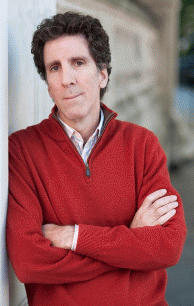Jon by Ellen Dubin Photography
JB: My guest today is Jon Reiner, author of The Man Who Couldn't Eat : A Memoir.
Welcome to OpEdNews, Jon. In 2010, you won the James Beard Foundation for Magazine Feature Writing. Your 2009 essay in Esquire by the same name later evolved into this book, published in September 2011. Wasn't it a bit unorthodox that the James Beard Foundation honored you for writing something that, rather than celebrating food in all its glory, dwelled primarily on food's assault on you and your inability to eat anything at all?
JR: Thank you for the opportunity to share my story with OpEdNews. When my Esquire editor, Mark Warren, contacted me after the James Beard Foundation Awards were announced and exclaimed, "We won!" it served as the commemorative start of a fruitful period of wonderful irony. I never intended this, but I have become the anti-food food writer.
It's a specialized niche; I am the only member, so we always have a quorum at the group meetings. Yes, it has all been extraordinarily unorthodox, but that's of a piece with the arc of my writing career. If you enjoy irony, this one has been the laugh that keeps on going. Recently, I was invited to be a keynote speaker at a food symposium, called MAD 2013, in Copenhagen this coming August. The symposium is led by Rene Redzepi, who is the chef at Restaurant Noma there, one of the top restaurants in the world. The other keynoters are all celebrated chefs and industry professionals. It's astonishing.
JB: It is! You've had a chronic case of Crohn's disease for years. And then, on top of it, you endured a botched emergency surgery that almost killed you. That's the basis of your book. And beyond telling that story, it also focuses an awful lot on food, most of which you couldn't or shouldn't eat. Have you thought about why and how food is so central to our experience, how we define ourselves and live our lives?
JR: Remember the old Joni Mitchell line, "You don't know what you've got till it's gone." That's a good starting point to explain my relationship with food and how it manifested itself in the writing process. Before I went through the months of Nothing-By-Mouth that prompted The Man Who Couldn't Eat, I never considered writing about food, which was odd both because it had become so prevalent in literature and because I was a voracious eater, a flavor fiend. And, I must confess, months into my food deprivation, the notion of telling the story of a profound episode through the absence of and craving for food still didn't occur to me.
During a hospital visit, my editor suggested to me the idea of writing about what it's like not to be able to eat. In my state -- miserable and despondent -- it took me a while to wrap my head around the concept. Eventually, when I started writing, the story became unstoppable. Food, in all of its dynamic elements -- taste, craving, appetite, smell, sense memory, psychology, family dynamics, occasion, history, culture, politics, economics -- offered a conceit that was as rich as anything I'd tried in my writing before. Food's universality enabled me to tell a story of personal trauma without worrying "Who's going to care?' Food is as essential as breathing, and, at the risk of putting too fine a point on it, it gave me breath as a writer. It sustained my storytelling.
JB: How did serious and chronic illness affect your family? Your marriage? Your relationship with your kids? Your thoughts about yourself?
JR: Before I get to this, I see that Michele Bachmann said that people who are unemployed should starve. I recognize now that The Man Who Couldn't Eat isn't about illness; it's about unemployment.
JB: She'll change her tune as soon as she finds herself jobless.
JR: One can only hope that reason will penetrate the cranium of the not-soon-enough-ex-Representative from Mars. On the other hand, I just received a Tweet from a reader that stated: "The other day I spent my last 30 pounds [currency] on face paint and glitter. Now I can't afford food." In this case, the congresswoman might have a point.
Regarding your question about the impact of illness on me and my family, it's no picnic. During the period of The Man Who Couldn't Eat, my health-related encumberments and limitations isolated me physically, the Nothing-By-Mouth regimen isolated me socially, and the depression of declining health isolated me psychologically. I was a stay-at-home dad of two school-age children who was no longer capable of providing for their many daily needs.
(Note: You can view every article as one long page if you sign up as an Advocate Member, or higher).






